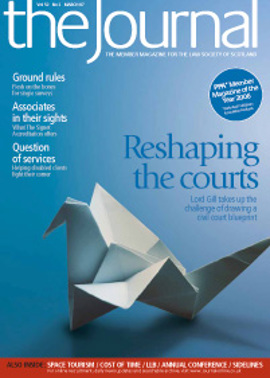A welcome review

“Justice is at the heart of a peaceful and prosperous society”, writes Justice Minister Cathy Jamieson, in the foreword to Modern Laws for a Modern Scotland: a report on civil justice in Scotland. This commendably clear and accessible analysis of the current state of civil justice in Scotland from the Scottish Executive is very welcome. The Scottish Consumer Council has long argued for a review of the civil justice system in Scotland, and we are delighted that the report promises a review of the civil courts, to be led by Lord Gill, the Lord Justice Clerk.
People cannot have access to justice if they are unable to use the civil justice system. Under the present system, many people with civil disputes are denied access to justice. In many cases, they lack legal representation, either because they are ineligible for legal aid, or because the costs of pursuing or defending the matter are disproportionate in relation to the sum of money involved. Many people lack the necessary information and advice about their rights, while they also perceive the courts as intimidating, remote and complex.
Those with civil disputes in Scotland have negative perceptions about the civil justice system, more so than their counterparts in England and Wales. They associate the courts with criminal matters, and this makes them reluctant to use them. The courts are generally very formal, and even the most confident non-lawyer is likely to be intimidated by the gowns, wigs and procedures, even in the small claims court.
It is vital that the system is reformed to ensure that it serves the interests of such individuals, as well as those of businesses and public bodies which have to use it. If Scotland is to prosper in the 21st century and beyond, it needs a civil justice system that is efficient and effective, as well as fair and accessible.
The current system is based on a traditional adversarial, court-based approach to resolving disputes. It is time that this approach was radically reconsidered. We agree with the conclusions of the Civil Justice Advisory Group, set up by the Scottish Consumer Council and chaired by Lord Coulsfield, that the system should encourage the resolution of disputes as early as possible, and that the courts should be viewed as a last, rather than a first resort. We hope that this important principle will underpin Lord Gill’s review.
We know that those with disputes want them to be resolved as quickly and informally as possible, and don’t want to go to court unless they have to. We would like to see increased use of mediation and other methods of dispute resolution where appropriate. This should be backed up by a less formal system for dealing with lower value consumer disputes, ideally outwith the courts altogether, where these cannot be resolved informally.
We hope that Lord Gill’s review will focus on the main areas of concern identified by the Civil Justice Advisory Group, and which the new Scottish Executive report also identifies as the key areas most urgently in need of review.
First, the review should focus on the need to find a more proportionate way of dealing with disputes, particularly those with a lower financial value. Secondly, it should examine the relationship between civil and criminal business in the courts. There is currently no clear physical separation between the civil and criminal courts at either sheriff court or higher court level. Consequently, the public tends to associate the courts with criminal matters, which can contribute to a reluctance to become involved in civil proceedings. Moreover, criminal cases take priority in the organisation of court business, with the result that procedure in civil cases is always open to disruption and delay, increasing costs, stress and inconvenience for all involved.
Thirdly, there should be an examination of the potential benefits of increased specialisation within the courts. We believe that, where practicable, this is in the interests of justice, as demonstrated by the success of existing specialist tribunals, commercial and family courts. Finally, the review should consider the scope for increased case management. There have already been some successful examples of this – in the Glasgow commercial court, for example – and we think there is room for further development here. This might include, for example, provision for the court to refer cases to alternative dispute resolution. We would also like to see the introduction of a class actions procedure in Scotland, which would increase access to justice for consumers.
In this issue
- A look in the mirror
- A welcome review
- Squaring the circle
- Profitability and financial structure
- Access-ability
- Culture change
- Practice? What practice?
- Signet badge takes wing
- Four in one
- Appreciation: Angus McLean
- In on the Acts
- "Lossiemouth, we have a problem"?
- Flagging up VAT
- In the family way
- Practice inside out
- Shape of things to come
- Breaking down a brick wall?
- Playing by the rules
- Scottish Solicitors' Discipline Tribunal
- Website reviews
- Book reviews
- Funny thing
- PIPs' hour approaches
- Enabled in the housing market
- Registers refresher






